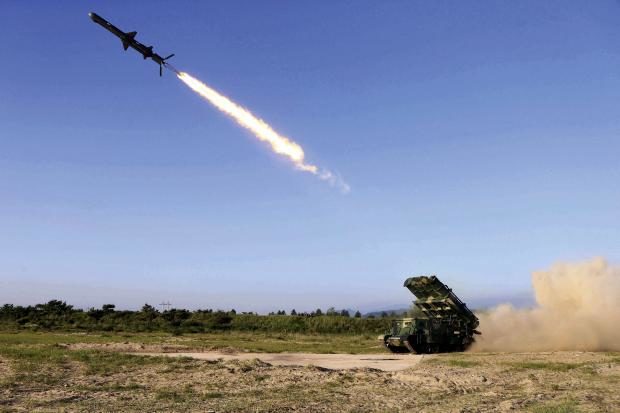Possible scenarios for next stage of North Korea crisis

This undated photo, distributed on Friday, June 9, 2017, by the North Korean government, shows a test of a new type of cruise missile launch at an undisclosed location in North Korea. Independent journalists were not given access to cover the event depicted in this image distributed by the Korean Central News Agency via Korea News Service. North Korea said Friday it has test-launched a new type of cruise missile capable of striking US and South Korean warships “at will,” as South Korea found a suspected North Korean drone near the tense border between the rivals. Photo from Korean Central News Agency/Korea News Service via AP
The crisis over North Korea’s nuclear program heated further Thursday, with President Donald Trump underscoring his threat to rain “fire and fury” on Kim Jong-Un, saying the stark warning maybe “wasn’t tough enough.”
The latest escalation in the long-simmering stand-off has set the world on edge, with stock markets down and jittery observers now openly pondering whether the risk of nuclear conflict is real.
But despite the unpredictable nature of both Kim and Trump, other officials in the US adminstration have sidestepped the president’s strident rhetoric.
Secretary of State Rex Tillerson assured Americans they should not be losing sleep over the crisis, while Pentagon chief Jim Mattis issued a very carefully worded statement that warned North Korea it would be “grossly” outmatched in any conflict.
War
Pentagon scenarios for military intervention range from limited surgical strikes on nuclear targets to a preemptive “decapitation” attack to take out Kim or force a popular uprising that would lead to regime change.
Article continues after this advertisementBut any sort of military action would bring enormous, and unknowable, downsides. Mattis has repeatedly warned of devastating consequences, saying it would be “like nothing we have seen since 1953,” referring to the end of the Korean War.
Article continues after this advertisementKim has amassed artillery units along the border with South Korea, whose capital, Seoul, is only about 35 miles (55 kilometers) away.
Limited shelling and rocket fire would likely lead to mass casualties in the city of 10 million and experts warn that any conflict would quickly escalate, with geopolitical repercussions, upheaval of the global economy and huge death tolls.
Still, when asked Thursday what could be tougher than “fire and fury,” Trump said: “We’ll see.”
Too soon?
Joel Wit, a senior fellow at the US-Korea Institute at Johns Hopkins University and an expert on the North’s nuclear weapons program, said the current conversation is overplaying the likelihood of war.
“There are a lot of statements going back and forth that are escalating tensions, but in the real world, on the ground, particularly in North Korea but I suspect also in South Korea, life goes on,” he said.
It is almost harvest season in North Korea and Kim has not ordered any mobilization of work forces away from the fields or factories, 38 North analyst Joe Bermudez added.
He said it would not behoove Kim to enter into a conflict as any mobilization could cause massive food shortages.
“Kim Jong-Un is not a stupid person,” Bermudez said. “It is unlikely that he would mobilize the nation at this point in time.”
China and economic pressure
The UN Security Council at the weekend passed a new set of sanctions against Pyongyang over its weapons programmed, including bans on the export of coal, iron and iron ore, lead and lead ore as well as fish and seafood from the impoverished state.
The measures were approved unanimously — including by China, the North’s sole major ally and economic lifeline — and Russia.
Their fate hinges largely on China, which accounts for 90 percent of trade with North Korea but is suspected of failing to enforce past UN measures, even after voting in their favor.
Trump has repeatedly tried to pressure China into taking a harder line on North Korea, but Beijing is fearful of a collapse of Kim’s regime.
“I think China can do a lot more,” Trump said Thursday, adding that if Beijing ramps up its pressure on Pyongyang he would take a more favorable view of America’s trade deficit with the Asian giant.
Back to the negotiating table
North Korea is now nuclear armed and has reportedly produced a nuclear warhead small enough to fit on its rockets, leading some to say the time to take military action has already passed, and the world will need to learn to live with a nuclear North Korea.
Jeffrey Lewis, an expert with the California-based Middlebury Institute of International Studies, said the US will quickly come to the conclusion that there are no good military options.
“The only thing that’s left is to talk to the North Koreans … about reducing tension and trying to solve some of the security disputes — and not getting rid of the nuclear weapons.”
Lisa Collins of the Center for Strategic and International Studies said that most experts recognize the only real viable solution at this point will come through some sort of negotiations and diplomatic settlement.
Through the 2000s, six-party talks among China, Russia, Japan, South Korea, North Korea and the US appeared to draw Pyongyang, then under the rule of Kim’s father Kim Jong-il, toward some level of outside nuclear monitoring and a possible slowdown in their program.
But that process collapsed in 2009, and since gaining power two years later, Kim has dismissed the idea of talks.